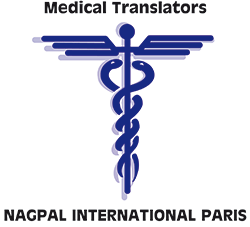
Medizinische Übersetzer
Paris • Cambridge • New York
65, rue Pascal 75013 Paris Frankreich
Tel: +33 (0)1 47 07 55 28
Fax: +33 (0)1 43 37 11 46
E-mail:
Mitteilung des Vorsitzenden
zum Thema Qualität
Qualitätsrichtlinien für unsere Übersetzer
Beispiele unserer Arbeit
Aortic surgery (von Französisch in Englisch)
VASODILATORS DURING ABDOMINAL AORTIC SURGERY
WITH MONITORING OF PULMONARY ARTERIAL
PRESSURE AND PULMONARY WEDGE PRESSURE
Report of 10 cases
M. GEORGE, C. HERCULE, P. VIAL and J. VILLARD
Summary:
Ten patients undergoing infra-renal abdominal aortic surgery were studied from the hemodynamic point of view during the operative period. The most important changes seem to be related to anesthesia induction of anesthesia and to changes in the patient's position (increase in pulmonary wedge pressure (PWP), central venous pressure (CVP), total peripheral resistance index (TPRI), fall in cardiac index (CI), systolic index (SI) and left ventricular systolic work index (LVSWI)). Aortic clamping and declamping did not produce significant changes and the values found at the end of operation were the same as, or slightly greater than, pre-operative values.
Monitoring of pulmonary arterial pressure (PAP) and pulmonary wedge pressure (PWP), (more reliable parameters than central venous pressure, CVP) allows optimal volume loading in these patients. In particular, as soon as an increase in pulmonary wedge pressure (PWP), blood pressure (BP), or arterial pulmonary pressure (PAP) is noted, a strong vasodilator such as nitroglycerin can be administered. This drug was used because of the high incidence of coronary artery disease in this group of patients.
The use of nitroglycerin appears to have induced good hemodynamic stability because there were no significant changes in the hemodynamic parameters during aortic clamping and declamping.
None of the major complications frequently seen in this type of surgery (myocardial infarction, cerebro-vascular accident, heart failure or renal failure) were noted.